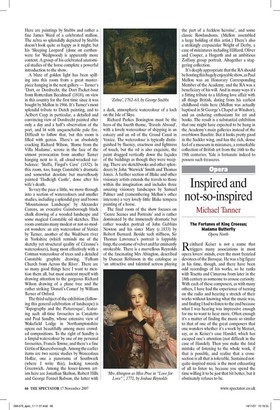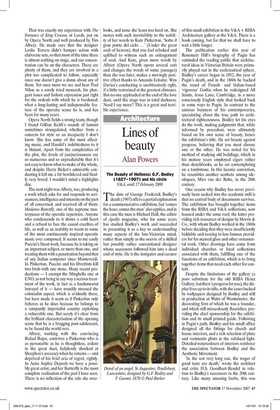Inspired and not-so-inspired
Michael Tanner The Fortunes of King Croesus; Madama Butterfly Opera North Reinhard Keiser is not a name that triggers many associations in most opera lovers' minds, even the most frenzied devotees of the Baroque. He was a big figure in his time, though, and there have been odd recordings of his works, so he ranks with Traetta and Cimarosa from later in the 18th century as someone to arouse curiosity. With each of these composers, as with many others, I have had the experience of turning on the radio and hearing a stretch of their works without knowing what the music was, and finding I had to listen to the end because what I was hearing was impressive enough for me to want to hear more. Often enough it's a matter of finding the music so similar to that of one of the great composers that one wonders whether it's a work by Mozart, say, or in Keiser's case Handel, which has escaped one's attention (not difficult in the case of Handel). Then you make the fatal mistake of listening to the whole work, if that is possible, and realise that a crosssection is all that is tolerable. Sustained notquite-inspired music is the most exhausting of all to listen to, because you spend the time willing it to be just that bit better, but it obstinately refuses to be.
That was exactly my experience with The Fortunes of King Croesus at Leeds, put on by Opera North and well produced by Tim Albery. He made sure that the designer Leslie Travers didn't hamper action with elaborate sets, so that most of the time there is almost nothing on stage, and our concentration can be on the characters. There are plenty of them, and they are involved in a plot too complicated to follow, especially since one doesn't give a damn about any of them. Yet once more we see and hear Paul Nilon as a sorely tried monarch, his plangent tones and forlorn expression just right for the ordeals with which he is burdened; what a long-lasting and indispensable feature of the operatic scene he is, and has been for many years.
Opera North fields a strong team, though I found Gillian Keith's sounds of lament sometimes strangulated, whether from a concern for style or an incapacity I don't know. She has some of the most affecting music, and Handel's indebtedness to it is blatant. Apart from the complexities of the plot, the levels of (un)seriousness are so numerous and so unpredictable that it's not easy to know what to make of the whole, and despite Harry Bicket's admirable conducting it left me a bit bewildered and finally very bored. I wouldn't mind a highlights disc.
The next night was Albery, too, producing a work which asks for and responds to seriousness, intelligence and intensity on the part of all concerned, and received all of them: Madama Butterfly, one of the supreme masterpieces of the operatic repertoire. Anyone who condescends to it shows a cold heart and a refusal to face the casual cruelties of life, as well as an inability to warm to some of the most continuously inspired operatic music ever composed. It seems to me easily Puccini's finest work, because he is taking on an important subject, or more than one, and treating them with a penetration beyond that of any Italian composer since Monteverdi. In Pinkerton, Puccini and his librettists kill two birds with one stone. Many recent productions — I exempt the Minghella one at ENO, as not being in any way a serious treatment of the work, in fact as a fundamental betrayal of it — have trendily stressed the colonialist aspect, which is evidently there, but have made it seem as if Pinkerton only behaves as he does because he belongs to a rampantly imperialist country exploiting a vulnerable one. But surely it's clear from the brilliant characterisation of the opening scene that he is a bragging post-adolescent, to be found the world over.
Albery, working with the convincing Rafael Rojas, contrives a Pinkerton who is as personable as he is thoughtless, ardent in the great duet, helplessly shocked at Sharpless's accuracy when he returns — and deprived of his brief aria of regret, rightly. In Anne Sophie Duprels we have a possibly great artist, and her Butterfly is the most complete realisation of the part I have seen. There is no inflection of the role she overlooks, and none she leans too hard on. She moves with such inevitability to the nobility of her words to Kate Pinkerton, 'Sotto il gran ponte del cielo ' (Under the great arch of heaven), that you feel rebuked and uplifted to witness such an enlargement of soul. And Kate, given more words by Albery (Opera North opens several cuts and changes the words of some passages) than she was later, makes a movingly positive effect thanks to Amanda Echalaz. Wyn Davies's conducting is unobtrusively right, if a little restrained at the greatest climaxes. But no one applauded at the end of the love duet, until the stage was in total darkness. Need I say more? This is a great and terrible experience.





































































 Previous page
Previous page